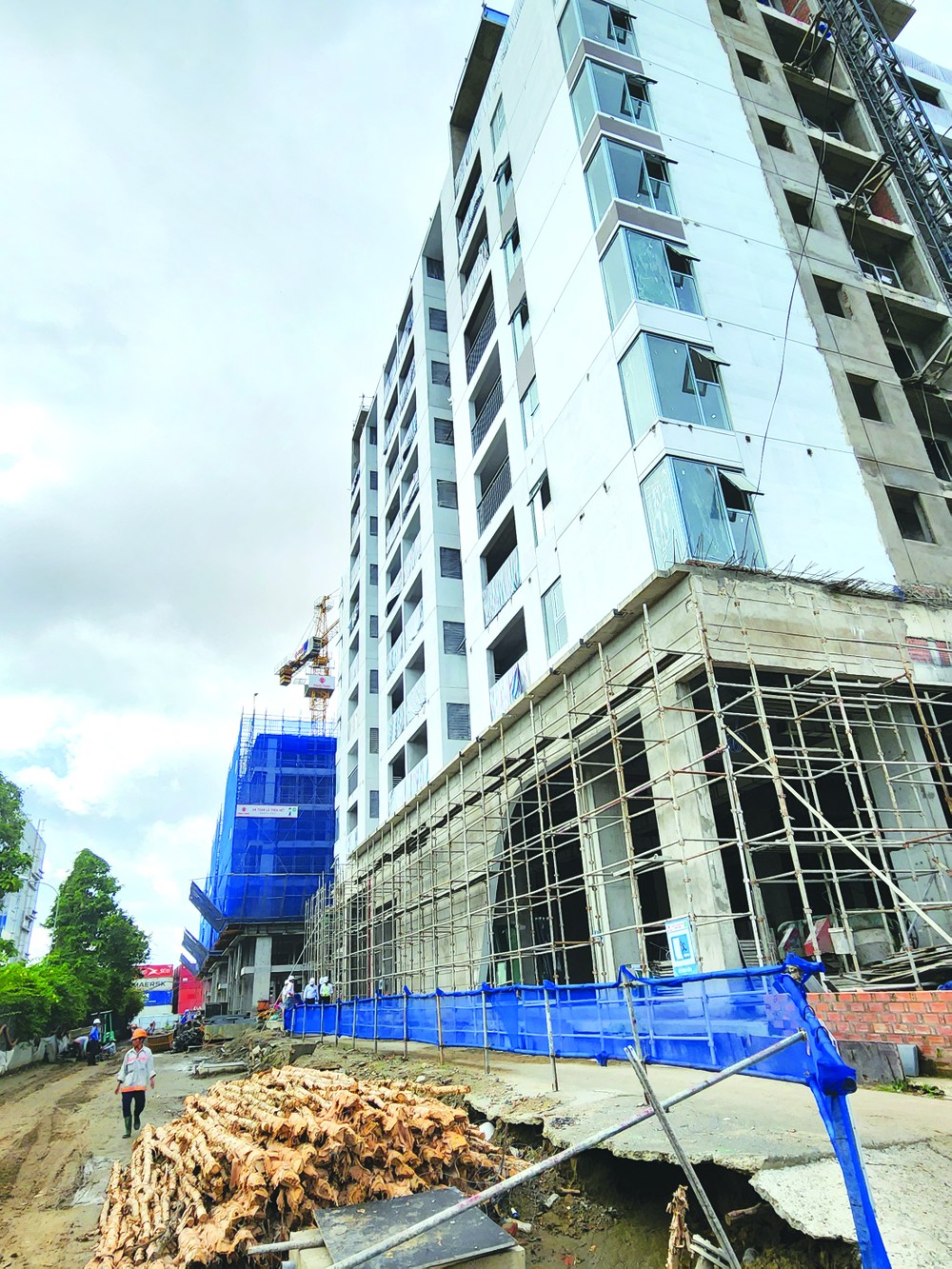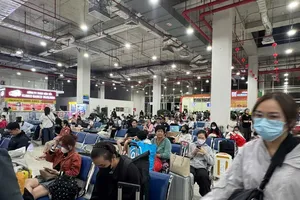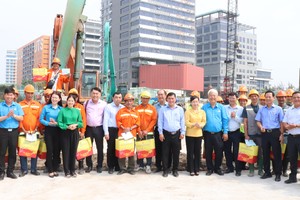
One of the Prime Minister's instructions at the regular Government meeting at the end of 2023 is that localities were soon to complete the building of 130,000 social houses because the rate of social housing development in the country in general and in Ho Chi Minh City, in particular, is still very low compared to the set goals and people's needs. In the current context, the southern metropolis is making efforts to achieve the goal of developing social housing as per the Prime Minister’s guidance.
Ms. Tran Thao Duyen from the Central Highlands Province Gia Lai has been studying and working in Ho Chi Minh City for nearly 10 years but she dares not dream about a house of her own after looking at the current real estate price list in Ho Chi Minh City. The cheapest commercial apartment is more than VND40 million (US$1,624) per square meter while her monthly salary is about VND15 million but she has to spend more than VND4 million on rent, food and many other expenses.
The young girl moaned with so little money saved, she really dared not think about buying a commercial apartment, even in installments but a social housing apartment. But she is required to pay personal income tax, while those who are entitled to support packages and social housing purchase programs are not required for personal income tax, said Ms. Duyen.
Similarly, worker Nguyen Thi Tuyet and her husband at Dong Nam Industrial Park in HCMC’s Cu Chi outlying district said that the couple and two children live in a boarding house near the industrial park so it is easy to get to work. The boarding house is damp while the 16-square-meter room is so small, the living conditions are not very good. They always dream about buying a social housing apartment to stabilize their lives.
Noticeably, the demand for social homes among low-income earners is massive, but the supply is limited, especially for workers with average and low-income levels.
The city government and local levels, departments and agencies have worked hard to promote the development of social housing, but in reality, the supply is still below expectations. Developers of social housing apartments in Ho Chi Minh City have recently encountered many difficulties in investment implementation procedures. Mr. Vo Minh Hoang, General Director of Ho Chi Minh City Social Housing Joint Stock Company, said that the social housing development policy is correct but the government still need to support businesses more.
Previously, businesses while building commercial housing realized that people's need for housing was very huge, but the supply did not meet demand. In fact, the majority of buyers invest in apartment projects for sale, while people with the real demand for housing is only more than 30 percent. According to Mr. Vo Minh Hoang, when he joined in social housing apartment project, he found it more difficult than building commercial apartment buildings.
Specifically, in addition to capital difficulties, investors are also facing land fund obstacles. Currently, there are only two types of land funds including land negotiated, compensated, and cleared by businesses themselves, or land owned by the State. In particular, land managed by the State will be deployed more effectively, so it is necessary to review this land fund, put it in the list of social housing development, and then bid to select investors.
Building social housing takes longer and is more difficult than building commercial housing, making businesses less interested, said Mr. Vo Minh Hoang. He suggested the city establish a committee specializing in social housing development to regularly contact businesses to solve problems.
The Ministry of Construction has just sent a report to the Prime Minister on the number of social housing projects registered for completion in 2024 of localities. Accordingly, 63/63 localities registered to complete a total of 108 projects, with a scale of 47,500 apartments this year.
Of localities, Hanoi registered three projects with nearly 1,200 apartments while Ho Chi Minh City registered 6 projects with nearly 3,800 ones. These two big cities registered to build more than 18,700 apartments and more than 26,000 apartments, respectively in the period 2021-2025 according to the Project ‘Investment in construction of at least 1 million social housing apartments for low-income people and industrial park workers in the period 2021-2030’ approved by the Prime Minister. However, in reality, the implementation of social housing projects in Ho Chi Minh City is quite slow.
According to statistics, in the period 2016-2020, the whole city had only 20/39 completed projects accounting for 21.5 percent. As of the end of the third quarter of 2023, only 2/91 projects have been completed accounting for 2.39 percent in the period from 2021 to 2025. At present, the city has only 7 social housing projects and worker accommodation projects under construction with a scale of about 5,000 apartments; thus, it is still very far from the registered goal.
According to the assessment of the People's Council of Ho Chi Minh City, the target is to complete and put into use about 12,000 social housing apartments, equivalent to 1.15 million square meters of floor space reaching 46 percent of the target set for the 2021-2025 period is also very difficult to complete as expected not mention to the social housing development target in the Resolution No. 30/NQ-HDND of the Ho Chi Minh City People’s Council’s and Prime Minister’s Decision No. 338/QD-TTg .
At the year-end session of the 10th tenure People's Council of Ho Chi Minh City, Director of the Department of Construction Tran Hoang Quan said that the current housing development in Ho Chi Minh City is facing difficulties and many problems have occured at the compensation and site clearance stage.
Regarding mechanisms and policies, Mr. Tran Hoang Quan said that the long-term capital source to support investors to borrow and implement social housing projects, and the beneficiaries of the social housing policy to borrow capital to buy houses, are not stable. During the 2016-2020 period, the Ho Chi Minh City Bank for Social Policies was only granted about VND150 billion in capital to lend to borrowers to buy social housing at an interest rate of 4.7 percent.
However, this loan level is still low compared to the value of the house and just a few people are entitled to the preferential loans. On the other hand, investors have not had access to this capital source, leading to having to borrow from commercial banks at high interest rates, leading to an increase in the cost of social housing.
The Director of Ho Chi Minh City Department of Construction also pointed out that the investment procedures for social housing projects are still complicated, leading to not attracting many investors to invest in the projects.
In addition, the regulation that within five years after social housing projects start coming into operation, investors must set aside at least 20 percent of the project's apartments for rent before selling them. This regulation slows capital recovery and is less attractive to investors. From the above practical bottlenecks, Mr. Tran Hoang Quan suggested relevant agencies to issue guidance for the synchronous investment process and procedures for social housing projects.
At the same time, he proposed to promulgate regulations guiding the determination, allocation and completion of payment of compensation costs, site clearance, and technical infrastructure investment costs for investors of commercial housing projects when investors hand over 20 percent of the land fund of their projects to build social housing.
Furthermore, he proposed the Government allow the extension of the interest rate support period for businesses, individuals and households receiving loans according to the Government's Resolution 11/2022 until the end of 2025.
























